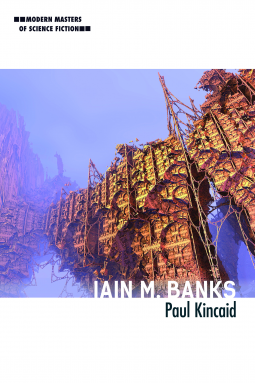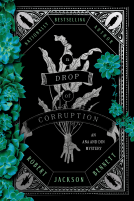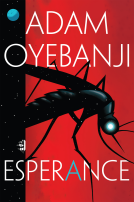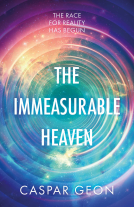
Iain M. Banks
by Paul Kincaid
This title was previously available on NetGalley and is now archived.
Send NetGalley books directly to your Kindle or Kindle app
1
To read on a Kindle or Kindle app, please add kindle@netgalley.com as an approved email address to receive files in your Amazon account. Click here for step-by-step instructions.
2
Also find your Kindle email address within your Amazon account, and enter it here.
Pub Date Jun 05 2017 | Archive Date May 10 2017
Description
The 1987 publication of Iain M. Banks's Consider Phlebas helped trigger the British renaissance of radical hard science fiction and influenced a generation of New Space Opera masters. The thirteen SF novels that followed inspired an avid fandom and intense intellectual engagement while Banks's mainstream books vaulted him to the top of the Scottish literary scene.
Paul Kincaid has written the first study of Iain M. Banks to explore the confluence of his SF and literary techniques and sensibilities. As Kincaid shows, the two powerful aspects of Banks's work flowed into each other, blurring a line that critics too often treat as clear-cut. Banks's gift for black humor and a honed skepticism regarding politics and religion found expression even as he orchestrated the vast, galaxy-spanning vistas in his novels of the Culture. In examining Banks's entire SF oeuvre, Kincaid unlocks the set of ideas Banks drew upon, ideas that spoke to an unusually varied readership that praised him as a visionary and reveled in the distinctive character of his works.
Entertaining and broad in scope, Iain M. Banks offers new insights on one of the most admired figures in contemporary science fiction.
Advance Praise
"Paul Kincaid has done an admirable job with this book, presenting us with the first really comprehensive survey of Banks' work across all his literary modes. Insightful, detailed, fair-minded, as generous as it is bracingly honest, it's a work that demands the attention of anyone with a real interest in this much-beloved author."--Alastair Reynolds, author of Poseidon's Wake
"A thorough, focused, and very useful study of the works of Iain Banks . . . with the M and without the M!"--Gwyneth Jones, author of Life
"A warmly appreciative yet acutely critical survey, clear, concise, and well-judged."--Ken MacLeod, author of The Corporation Wars: Insurgence
Available Editions
| EDITION | Paperback |
| ISBN | 9780252082504 |
| PRICE | $22.00 (USD) |
| PAGES | 200 |
Links
Featured Reviews
 Dan P, Bookseller
Dan P, Bookseller
An overview of the late great Iain Banks' work, with a few biographical details along the way. It focuses on the science fiction in his oeuvre, as a careful reading of the title will hint, but also includes the M-less books where they are relevant to a discussion, or borderline SF (like Transition). Kincaid has an interesting idea about RD Laing's theory of the divided self being the underpinning of Banks' novels, and his argument is pretty convincing. This is a concise and readable book, written for an intelligent reader but not drowning in academic language. As a fan of both versions of Banks, I'd have liked a bit more on books like The Crow Road, but they are understandably out of the scope of this book. It made me want to go back and reread the whole Banks catalogue, so that must be a recommendation.
Reading about the life of a person can go two ways; it can be dry and dusty or full of wit and wisdom. Iain M. Banks by Paul Kincaid falls into the latter with a style that represents Mr. Banks very well, I think.
Mr Kincaid's biography of this science fiction/fiction master is light, but yet meaningful. It is comprehensive, detailed and enjoyable. Iain Banks' novels resonated through the world as each book was published. Iain M. Banks walked the line between fiction and science fiction. This novel seems to walk the line between biography and fiction in a similar fashion. Honest, brutal, yet showing a love for the worlds created and words written by Mr Banks.
In this work, Mr Kincaid offers us an insight into the man that was always destined to be a writer. This is a broad and engaging novel that will broaden your understanding of a man that something defied understanding.
5 out of 5 stars.
 Kevin K, Bookseller
Kevin K, Bookseller
A concise yet comprehensive literary analysis on the works of the late Iain Banks. Kincaid’s writing functions primarily through illustrating and deconstructing the thematic lineage and interplay between Banks’ novels published with and without the M, but also delves into the deeper political and societal backdrop in which Banks’ wrote and lived. The bits of history that Kincaid feels influenced Banks are particularly illuminating for myself, someone who knows little of Scottish or UK life, especially concerning the 70s and 80s.
Not as obviously praising of Banks’ writing as Simone Caroti’s The Culture Series of Iain M. Banks: A Critical Introduction, and in a lot of ways it does feel like a response to it. Caroti called for a need to examine Banks’ entire catalog of writing, not just the M or non-M work as had previously been done. Kincaid’s book takes exactly this approach, but with an emphasis on his science fiction work. It is also a much more balanced examination of the strengths and weaknesses at play in the novels. That being said, the rabid Banks fan inside of me enjoyed Caroti’s book quite a bit more because it more closely aligned with my own reading and interpretation of Banks; which is of course an admittedly subjective, masturbatory reason.
Caroti’s book started a new conversation; addressing the ways in which Banks had been grossly ignored, misunderstood, and misinterpreted in literary circles and criticism over the years. It posited a much better interpretation of Banks’ work than had previously existed. I’m please to see that it appears Caroti’s contribution had it’s desired effect, because this continuation of the conversation seems to have benefited greatly from it. Gone are the misreadings and general sloppy analogies in the pre-Caroti analyses. Of course, as a result, Kincaid is much more objective and more in line with a standard literary analysis, which is more intellectually pleasing, but it remains thoughtful to the corrections and additions that Caroti made previously.
The bulk of this analysis deals with Banks’ writing chronologically, but also takes into account the order in which the novels were written, rewritten and released. Since so many of them -- the Culture novels specifically -- were written very early and then reworked later in Banks’ career before being published, this method helps to trace the evolution of themes and thoughts throughout the novels as they changed and adapted. There are quite a few biographical details and quotes interspersed throughout, which I always welcome, especially considering that there is still no extant proper biography on Banks. The book then comes to a close with an illuminating interview between Banks and Jude Roberts, who received his P.h.d. on The Culture series.
This book is something I’ve been waiting a long, long time for, and I am extremely pleased that Kincaid has not only continued the conversation on Banks’ work and legacy that Caroti jump started, but also added so much to it in the process. This is a fantastic addition to the Modern Masters of Science Fiction series and I look forward to seeing where we go from here. Personally, I feel that Banks’ work needs to endure the test of time, and welcome future writings on him as a subject.
 Keith C, Educator
Keith C, Educator
‘Outside Context Problem’
This is a very readable, concise and scholarly study of Banks’ science-fiction novels. As the title indicates, the author focuses on those under the name Iain M Banks, but also discusses the ‘mainstream’ novels when the distinction is less clear. I suppose the inclusion of M in the authorial designation broadly indicates the novel falls into the space opera category, while the others are more generally imaginative or speculative.
There is discussion of all the Culture novels as well as the Culture itself. The early novels, so imaginatively written, so well structured, even concise, attract the greater part of the discussion. The author suggests that the Culture novels really reached their logical conclusion with ‘Look to Windward’ and subsequently Banks became increasingly devoted to religion and death in the later novels. These are not discussed in anything like the same depth as the earlier ones, even though they are all much longer, perhaps because Banks himself could not take the logical step of ending the series, just as his construct, the Culture, could not take the logical step of ending itself through the process of subliming. The Culture is described as an atheistic paradise and the writer discusses at length the problem about all paradises and heavens – the constant risk of eternal boredom! These novels are linked with relevant ‘mainstream’ novels such as ‘The Bridge’ or ‘The Business’ to demonstrate that Banks with or without an M was recognisably the same writer, one whose own biography had a profound influence on all his writing.
I suggest that this is not simply required reading for all of Banks’ many followers, but that it is thought-provoking, insightful and pleasurable too.
Readers who liked this book also liked:
John Kotter; Holger Rathgeber
Business, Leadership, Finance, Nonfiction (Adult)









